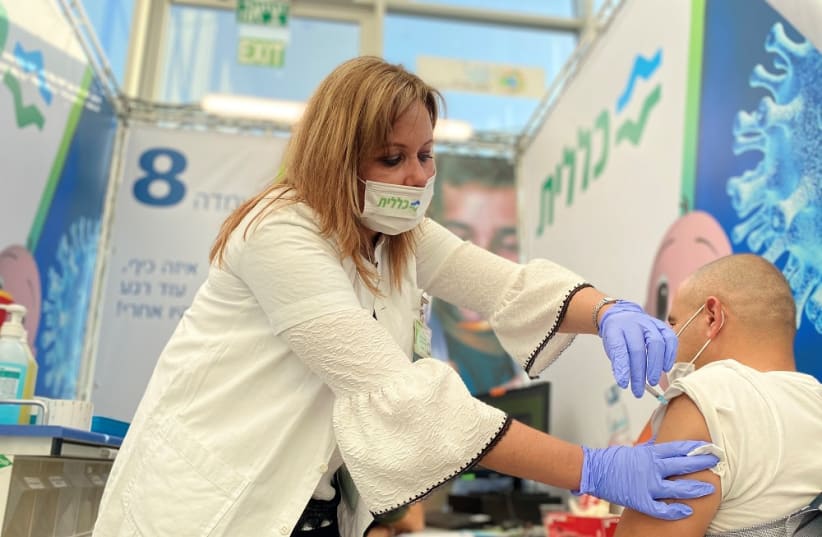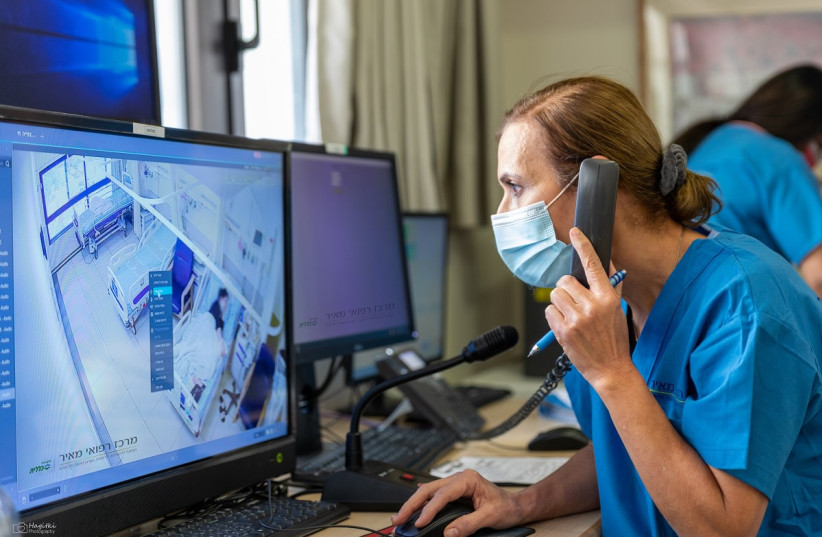Clalit stands at the forefront of Israel’s national effort against the coronavirus. The epidemic has presented unique challenges, and Clalit has distinguished itself in its clinical, research, operational, and managerial capabilities. The Israeli public has seen Clalit’s capabilities during this period in dealing with COVID-19, and they have been recognized around the world.
Clalit, Israel’s largest and leading health service organization, shapes and influences the Israeli health system. As a healthcare organization that provides medical services to 52% of the Israeli population (4.7 million patients), manages 1500 community clinics and 14 public hospitals, the challenge during the pandemic is great.
Clalit has used all the resources at its disposal to deal with Corona patients in hospitals and the community, at home, and is leading the fastest and most effective vaccination campaign in the world.
Clalit’s hospitals have been a backbone of the national hospital system, opening hospital wards to treat severe COVID-19 patients and complex medical conditions. Hospitals are adopting new technologies for remote monitoring and patient care, conducting collaborations with start-ups and leading research on the coronavirus, and have even opened clinics to treat those recovering from Corona while monitoring the long-term effects of the disease (long Covid).
Dr. Daniel King is an expert in pulmonary medicine and intensive care and manager of the Corona A section at Meir Hospital. “There were many challenges in setting up the ward,” he says, “but the main challenge is working for long hours under strict protective conditions that are challenging on several levels: the heat, the inability to drink and refresh even for a second, the physical limitations in movement and vision, and the distance from patients. We had many unforgettable experiences at the Corona ward, with many ‘first-time’ events. For example, the first time a corona patient entered the ward, the first time we connected a patient to oxygen, the first time we intubated a sick person, and, unfortunately, the first time we brought a family to say goodbye to a loved one on their deathbed. But the most meaningful experience was the discharge of the oldest patient, a 79-year-old to rehabilitation after surviving ventilation.”
Clalit also stands out in its care of COVID-19 patients within the community - those who are recovering at home. The State of Israel is among the few health systems where COVID-19 patients receive treatment and medical follow-up through the health maintenance organizations, and the family physician. This system, in which mildly ill patients are regularly cared for and monitored in their homes, enables optimal functioning of the in-patient system. Since the outbreak of the pandemic, 400,000 corona patients have been treated at home. In a short period, Clalit established a plan to accompany and monitor patients throughout the country. Family physician and nurses have maintained regular contact with those who are ill and have provided for all of their medical needs.
Dr. Roni Vered, Clalit’s Chief Physician in the Tel Aviv District says, “Managing the Corona Operation Center combines several essential roles. On a practical level, it means receiving daily lists of hundreds and thousands of new Corona patients, contacting them to provide guidance on quarantine and monitoring their medical condition, sending them kits for temperature monitoring, oxygen saturation meters, and supplying them with a contact to which they can turn at any moment if their condition worsens, or to taking care of various tests they were required to perform for non-corona medical issues.
“The biggest challenge for me was realizing during the early stages of the pandemic that most of the care of Corona patients rests on the community clinics’ shoulders and that the community health care operations can prevent a flood of new patients to hospitals. We continue to treat all other acute and chronic diseases, while treating Corona patients. About 60% of those who have had Corona in Israel have been treated by Clalit’s staff and have received medical and professional guidance.”
One of the cases that left a significant impression on Dr. Vered was that of a young woman who had just given birth and who was ill with Corona, together with her infant daughter. “She was at home alone, and she and her baby were ill. There was no family or friends who could help, and we, the command center staff, mobilized. We doctors and employees took care of everything she needed, from medication to diapers.”
The vaccination campaign has propelled Clalit and the State of Israel into the world’s consciousness. The successful and rapid vaccination campaign has been widely covered in the media in Israel and around the world. To date, Clalit has given 7,000,000 vaccine doses (first, second and third doses). At the peak of the operation, 150,000 patients were vaccinated each day, and hundreds of vaccination clinics operated daily. The response of the Israeli public has been amazing. Among the reasons for this are Clalit’s transparent conduct, supported by facts regarding the vaccine, and an unequivocal assurance from all parties in the health system that this is the only way to eradicate the epidemic. The combination of transparency, along with the public’s trust in clinic staff - doctors and nurses who have accompanied them for years - along with advocacy and educational activities on every possible platform and setting a personal example, caused the Israeli people to get vaccinated en masse. This feeling was strengthened when the public came to the clinics and encountered an easily accessible, friendly and orderly process.
Clalit and the State of Israel are currently in the midst of a vaccination campaign to provide the third vaccine (booster), thus making Israel’s citizens pioneers at the international level. Clalit immediately mobilized all that was needed for the effort with the reopening of vaccination centers to facilitate the rapid and effective vaccination of members of the populations entitled to the third vaccine dose.
Sefi Sobol Roitblatt, Director of the Corona Vaccine Operation Headquarter in the past year and currently Director of Nursing in the Sharon and Shomron District, says, “My job in the past year has been providing vaccines to 200 vaccine centers and managing inventory. The vaccination campaign is an ongoing operation that has involved determining the populations who were initially eligible for the vaccine – initially adults 60 and over, and eventually to the rest of the population. Bringing the vaccinations to those who were confined to their homes was challenging, as was bringing the vaccines to the at-risk population while maintaining the highest standards.”
The logistical operation was accompanied by the cooperation of many factors responsible for the safe arrival of the vaccines at the complexes. The vaccination centers offered extended hours of operation, and we had to respond at many hours of the day.”
Another significant achievement that brought Clalit exposure and international renown was a series of studies led by Clalit’s Research Institute regarding the effectiveness of vaccines. Clalit’s research capabilities culminated in the publication of a series of studies regarding the efficacy of corona vaccines and the resistance of the vaccine to various variants in the real world. Clalit was the first to publish the study, which appeared in the New England Journal of Medicine. The ability to take Big Data and translate it quickly into supporting information in medical decision-making has been a significant tool in formulating policy during the epidemic in Israel and worldwide.
The Corona pandemic that has forced social distancing has led to the development of solutions and technological innovations that have enabled the provision of “remote” medical services. The epidemic has been a test for remote medical care while removing regulatory barriers and lowering the threshold of suspicion of patients and medical staff to this new technology. At the height of the morbidity, more than 50% of family and pediatrician visits were conducted remotely online. The pandemic has shown that a suitable technological infrastructure, operational and managerial flexibility based on computerized medical files that centralize the information for each patient has made it possible to remotely administer quality medical care.
During this period, Clalit has continued to develop and adapt services tailored to patients’ needs. Services that can be used from home have been expanded, such as an online pharmacy service for home delivery, creating a network of volunteers that provides medications to at-risk populations, and the deployment of digital services that will enable telephone or video consultations with a family doctor, pediatrician, and consultants. Another example in online medicine is the new home ultrasound service that is being used by many pregnant women.
Still another example is Clalit’s initiative for conducting health promotion workshops and activities online, using a digital system to allow Clalit’s members to connect from their homes.This digital system has allowed Clalit to continue to offer quality health promotion group services on topics such as smoking cessation, weight control, diabetes, and breastfeeding, from their homes, during periods of personal quarantine. Since the beginning of the pandemic, over 4000 people have participated in these special activities.
Hedva Emuna, director of Clalit’s Southern District, sums up her feelings thus far.
“Dealing with the struggle against Corona has been a challenging experience. There have been several memorable landmarks, from the opening of complexes to conduct Corona tests, to vehicles that went to Bedouin villages to conduct testing.”
The fight against Corona is in full swing and is not over yet. On every possible front, Clalit is leading the way due to the capabilities of its 45,000 employees who work day and night to meet the needs of every patient and ensure the continuation of routine life as much as possible. The medical teams are imbued with a sense of mission and recognition that they are taking part in a historic event and are prepared for it with all their strength and energies.
This article was written in cooperation with Clalit

